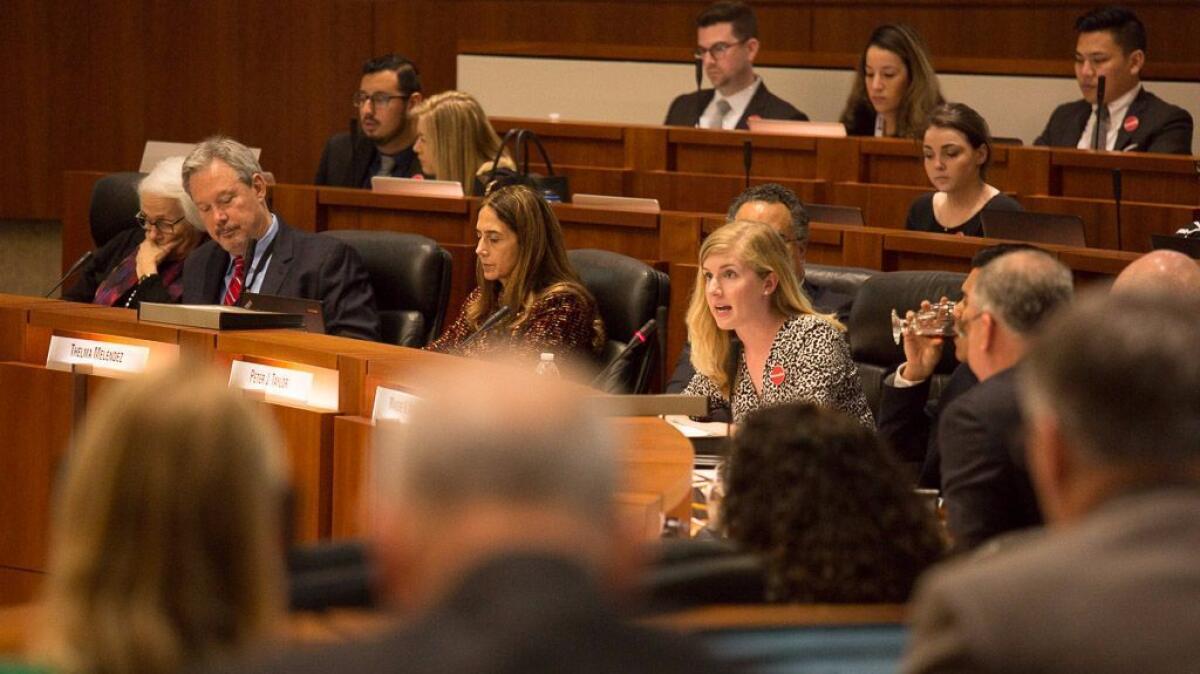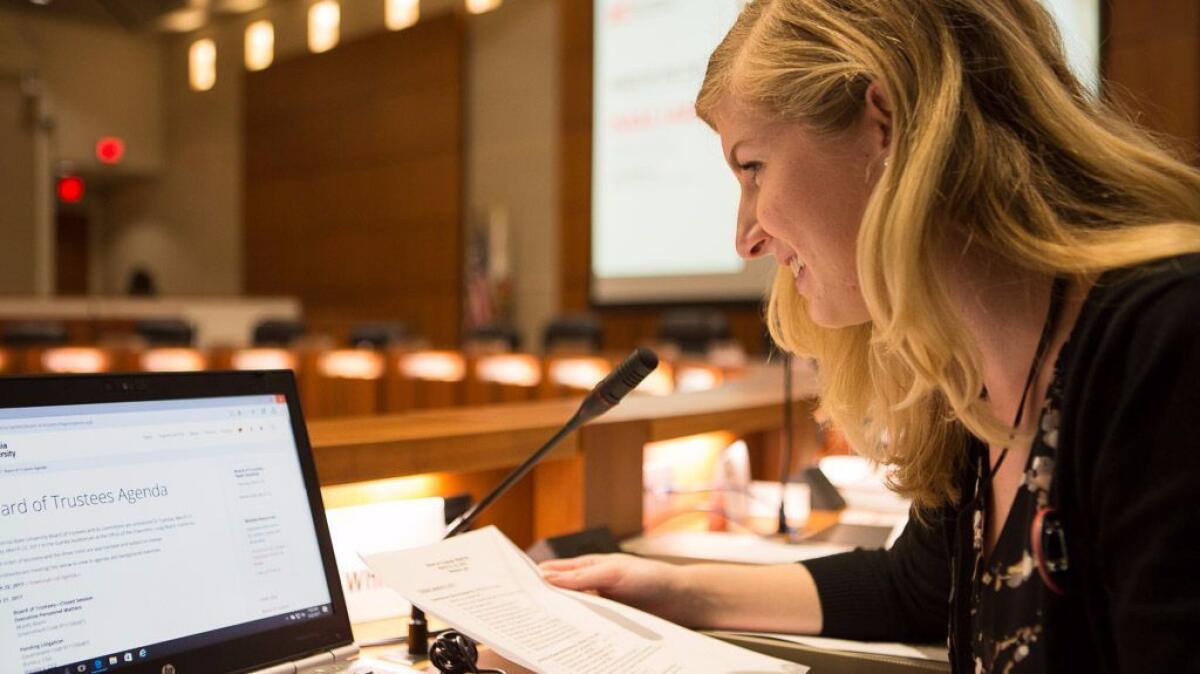Q&A: Campus conversation: Maggie White, California State University student trustee
For two years, Maggie White has been delivering impassioned speeches as a student appointee on
White grew up in Modesto, about 30 minutes from Patterson. Both of her parents are teachers — her father took it up after years of firefighting. In her hometown, going to a four-year college wasn’t a sure thing for many. She worked at a frozen yogurt shop and took classes at Modesto Junior College before applying to Cal State Stanislaus, her parents’ alma mater. She got her bachelor’s degree in communication studies in 2016 and hopes to earn her master’s in 2018.
White’s no relation, by the way, to Cal State Chancellor Timothy P. White, though the two occasionally messed up the roll call by answering for each other at board meetings.
In July, she takes over as the newly elected president of the California State Student Assn., the official group representing the university system’s entire student body.
She’s busy preparing for her new role, but took a moment to talk about the students she serves and the challenges facing the largest public university system in the country.
How do you get to know almost 480,000 students and their concerns, at campuses as different as Bakersfield, Chico and San Francisco?
“That was the question I had going into this.... How could any one person, especially one person like me, possibly represent all these students? I decided I was going to have to spend as much time as I possibly could visiting the campuses, meeting with students who were different from me.… I think the most important part of my job is knowing that I'm not speaking for myself when I'm in that boardroom — I'm speaking for the 479,999 students who aren't me.… I’ve learned a lot going to the big cities, San Francisco, L.A., where rent is so high. I don’t know how these students do it.… The first thing that comes up is always money.… If you look at the numbers comparing California State University to other comparable universities in the country, we actually have lower tuition. But the cost of living in California is so much higher. So I think we're going to have to see some sort of state support or some kind of support for housing, especially in metropolitan areas.”
“When I applied to be a trustee … I had no idea what anyone was talking about. It was all sorts of jargon, this initiative and that proposal, and I was like, ‘What does that even mean?’ … And so I came into this thinking, if I do nothing else, maybe I can break down some of this and speak it in plain English to students and just be on their level, because I'm there with them.
You’ve tackled a number of issues with fellow trustees— tuition hikes, homeless students, four-year graduation rates hovering at 20%. What other issues would you like to see addressed?
“The first thing that comes to mind is mental health resources. We were just talking about doing some sort of study … of how many mental healthcare providers there are across the system. We know that several campuses have hired a lot, some have hired less, and I'm hearing concerns from students. It takes three or four weeks, I've heard six weeks, to get an appointment with a counselor. Can you believe that? When you have a mental health crisis, and you finally get the guts or the initiative or the time to go on campus, go to your psychological services center and say, ‘I need an appointment with a mental health counselor,’ and they say, ‘OK, come back in a month’ — if it's not ‘Come back tomorrow’ or ‘Come back in an hour,’ that's not good enough. If someone was standing in front of you with a broken arm, you wouldn't say: ‘Come back in a month and we'll try to see you.’”
Getting an education is the No. 1 thing that you can do to take control of your own fate, your own destiny, and not let life just happen to you.”
— Maggie White, Cal State student trustee

What’s it like sitting in the meeting chambers, surrounded by legislators, the chancellor and university presidents?
“Jorge Reyes Salinas [the other student trustee] and I say this to each other before meetings: ‘Speak up even if your voice shakes.’ With the tuition issue this year, it was not easy or fun to talk about. It wasn't fun or easy for anyone on that board to talk about.... You've got a really intense crowd, and they have the right to be intense and I'm glad they're there being intense, but it is really difficult to sit there and sometimes say the thing that needs to be said, knowing that it's not what people want to hear. That doesn't mean you don't say it. It just means that your voice shakes as you say it.”

What are some issues at Cal State that people might not know about?
“I think about my dad a lot.... He’d gone to a couple junior colleges. Working three jobs and going to school, he literally would work nights as a security guard at a construction place, then go work somewhere else during the day, and then he would go to class in the evenings. He didn't finish his degree and went on to become a firefighter and did everything that he needed to do that. He'd been a firefighter for a few years, married my mom, had my older brother and realized that eventually he wanted to be a captain. Well, it's extremely competitive.… So even though he was a good firefighter, he was told you've got to get a bachelor's degree if you want to be competitive. And so my dad went back, he's doing shift trades to be able to go to his classes in the afternoon.… And my dad would go literally study all night at Kinko’s so that he wouldn't keep my mom and the baby up in their little house. So when he got that bachelor's degree — I think he was either 30 or 31 — he was the youngest fire captain in the history of our city.... We don't talk a lot about students who are parents, students who are married, students who are working full time. We talk a lot about students working two or three jobs, and that's important. But what about the person that works 40-plus hours a week, has a family but wants to get that bachelor's or master's degree? … We need to make sure there are enough childcare options. I'd really like to see more classes on Fridays and Saturdays, perhaps more online options. … We still cater so much to this 18-, 22-year-old model, but is that really our students? Is that really Cal State?”
What do you see yourself doing after graduation?
“Because of this position, I'm now so interested in higher ed advocacy and leadership.… Hopefully I’ll be making schools better so that girls like me and guys not like me and anyone else similar, not similar to me, has that opportunity to make their life better. Because getting an education is the No. 1 thing that you can do to take control of your own fate, your own destiny, and not let life just happen to you.”
Read more at Essential Education, our daily look at education in California and beyond »
Start your day right
Sign up for Essential California for news, features and recommendations from the L.A. Times and beyond in your inbox six days a week.
You may occasionally receive promotional content from the Los Angeles Times.




